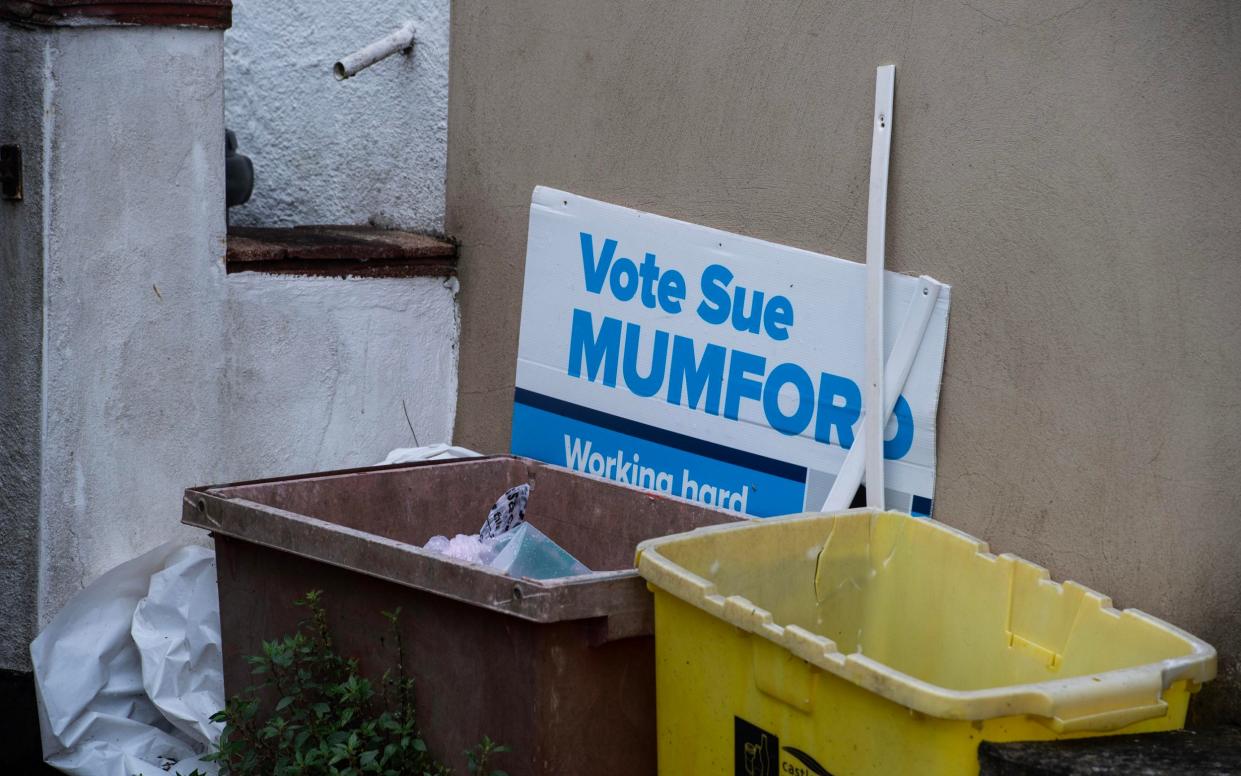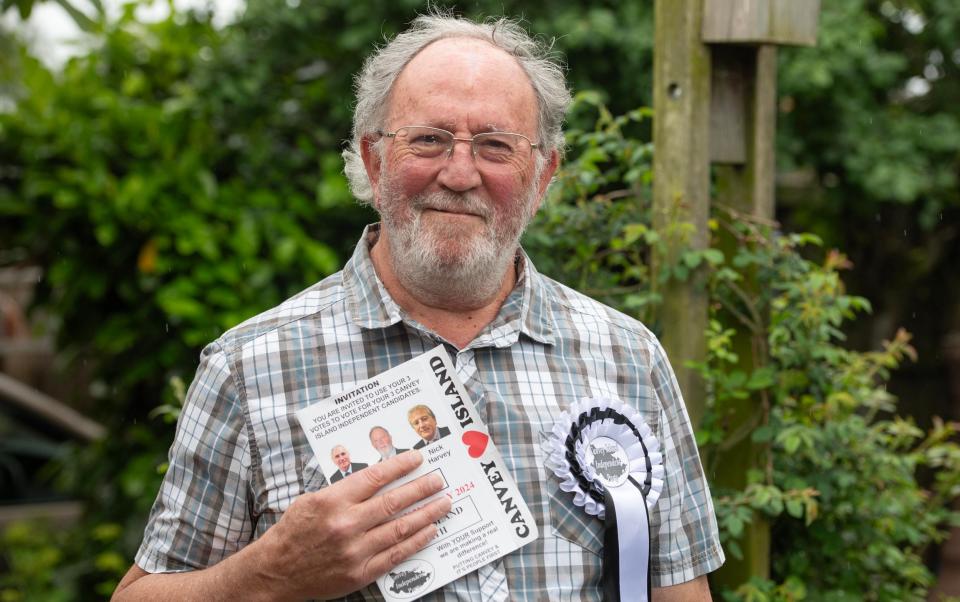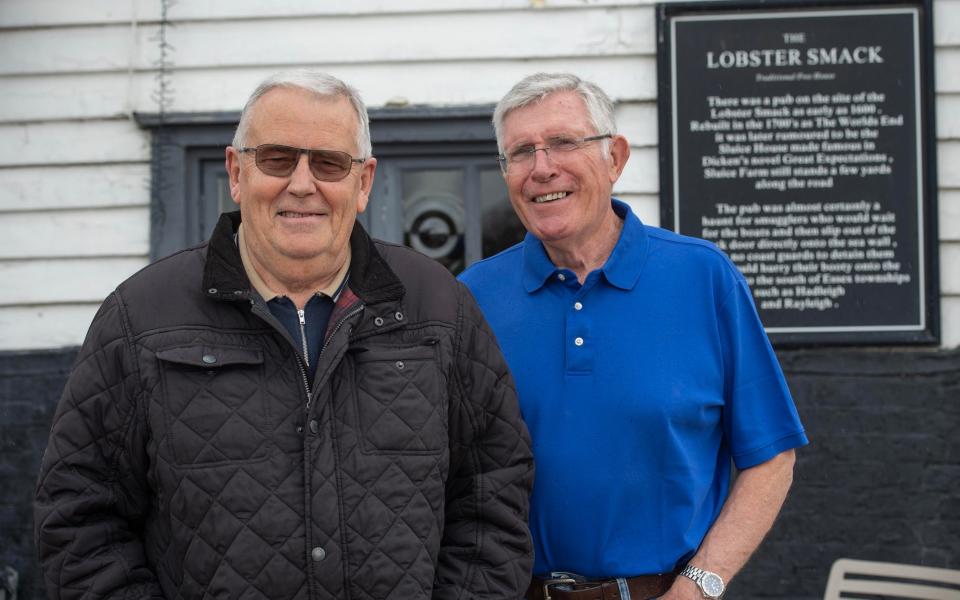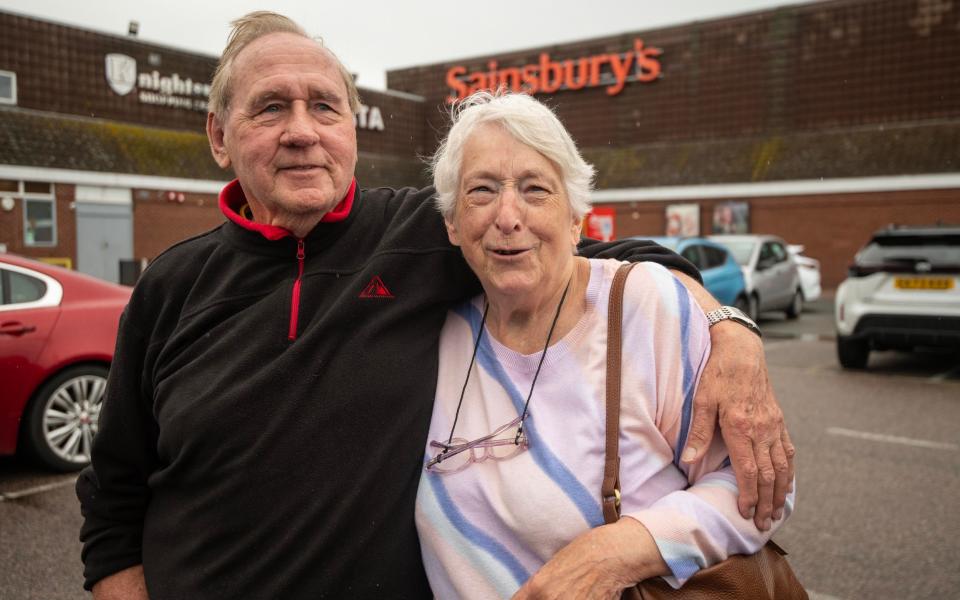The fully independent council setting alarm bells ringing for the Tories

In an upstairs window, a half-obscured sign pleads: “Vote Conservative”. Cobwebs hang around the doorbell, while another Tory election placard sits behind a recycling bin, presumably waiting to be carted off with the rubbish.
Welcome to Castle Point Conservative Association, housed on a residential street in Benfleet. Given the party’s recent electoral wipeout in this part of Essex, it’s hard to ignore all the symbolism.
Until 2022, the Conservatives had dominated locally for almost two decades. At the last general election in 2019, they retained not only their parliamentary seat but all 17 other seats in the county. And with a current majority of 26,634, Castle Point’s Tory MP Rebecca Harris is expected to hold on even in the event of a Labour landslide later this year.
In 2016, the Brexit vote was also exceptionally high locally, nudging 73 per cent. But the bad news, and not just for local Conservatives, but every mainstream party, is that the desire to “take back control” now seems so pervasive that it has turned convention entirely on its head.
In this month’s local elections, Castle Point Borough Council, which encompasses Canvey Island, recorded a remarkable result: every single seat was won by one of two local independent parties for the first time in the district’s history. The authority (in which no party has had a majority since 2022) will now be run by a coalition of the People’s Independent Party (PIP), with 24 seats, and the Canvey Island Independent Party (CIIP), with 15. It is the first time in England that every councillor elected to a local authority has been an independent.
Their success was perhaps rocket-boosted by the “human error” made by the Conservatives on the nomination papers, meaning 13 of their candidates were barred from standing. But speak to voters here and it’s hard to find any who backed the independents only for want of a Tory.
“People have had enough of the mainstream parties,” says the PIP voter Chris Cole, 59, who worked for an oil company before he retired. He’s sitting in Fatty’s Bar, Hadleigh, a venue that’s surprisingly lively in the middle of a weekday afternoon. He usually votes Tory in general elections. This time he feels he will “struggle picking”.
So why have the local Conservatives – who have lost all eight of their seats on Castle Point council – been so roundly rejected? And should this unusual result sound a warning to all the main parties before the general election?
The reasons for the shift are many, ranging from opposition to local house-building plans, to a more general feeling of disillusionment with the perceived failure of national parties to deliver the infrastructure and services people need.
On this flat, slightly desolate estuary landscape clinging to the edge of England, there’s also a fierce streak of independence that, in the case of Canvey Island, goes back quite some time. The CIIP was born 20 years ago, of a desire to ensure decisions affecting Canvey were made on the island, not the “mainland”. Two bridges connect the two, but residents of the once-bustling holiday resort harbour a sense of separateness.
Reports a few years back of a Catalan-style revolt aimed at breaking away altogether were wide of the mark, suggests Cllr Michael Fuller, the CIIP treasurer. But, he concedes, “there were moves we were trying to encourage about ‘could we have a breakaway council’, because we were once.”

Canvey was merged into one local authority incorporating part of the mainland in 1974. The CIIP originally aspired to revert to previous boundaries. “There was a feeling that we would like to get independent, away from the mainland council and take control ourselves. But we weren’t going to start putting up passport controls,” smiles Cllr Fuller.
We’re sitting in his modest bungalow, which doubles as the CIIP’s official address. The party doesn’t have a website.
“We’re not politicians,” stresses Cllr Fuller. “We don’t do politics. None of us has a political background.”
Nevertheless, he talks at length about matters that are definitely political: how public money should be spent; where houses should (or rather shouldn’t) be built; how people should be governed.
The CIIP is no longer agitating for separate governance from the mainland, according to Cllr Fuller. (Without a website, it’s hard to be sure exactly what they’re agitating for.) They do want a third road off the island, which lies below sea level and is vulnerable to flooding. Their current roads are “a disgrace”, claims their campaign material, “thanks to the Conservatives who run Essex County Council”.
‘We have to build ... responsibly’
In common with the PIP, which formed in 2021 to fight plans for 5,000 new homes, CIIP opposes greenbelt development. In 2022, the controversial local housing plan put forward by the Conservatives was overturned by the independents, who between them had 26 seats on the council by then, and who have been collaborating ever since. They are now working on a new, resident-led plan.
“We have to build houses, but make sure they’re built in the most responsible way, using [previously developed] brownfield [land] before we start using the greenbelt,” says Cllr Fuller, a retired research chemist who moved out here from Dagenham, east London, 40 years ago.
Development, of course, is a familiarly knotty issue faced by those in power – or vying for it – right across the country. Most voters acknowledge the need for more housing. But when it comes to actually building it in their area, often it’s another matter altogether. It remains to be seen whether the independents of Castle Point can square the circle more adeptly than the main parties.
The new administration doesn’t want to be dismissed as the outcome of an anti-Tory protest vote. Yet it’s hard to see the result – in the same county where in 2014 Douglas Carswell became Ukip’s first elected MP, in Clacton – as entirely divorced from the broader context.
Inside the Lobster Smack pub (where, incidentally, lobster is apparently never served), retired City workers Steve Farrow, 72, and Phil Goodwin, 73, are catching up at the bar over a pint. Low beams and maritime decor lend an old-world feel to an inn described in Rachel Lichtenstein’s book, Estuary, as “a former haunt of smugglers and bare-knuckle fighters”.
Farrow, who lives in the Castle Point neighbourhood of Daws Heath on the mainland, voted for the PIP. “If I said ‘greenbelt’, that sums it up,” he says. “It’s infrastructure,” chips in Goodwin, who voted Labour. “That’s the issue. All these new houses, extra cars, but no [new] major roads.”
But do they believe the local election result sends out a nationally relevant message? “I would imagine someone must be sitting up and saying, ‘wow, if it can happen [there],” says Farrow. “I don’t know if [the Conservatives] will learn the lesson.”

Away from Canvey’s rainswept beaches, the unmistakable smell of gas hangs in the air. The world’s first marine terminal for imported liquefied natural gas was built here in 1959. Six years earlier, the North Sea floods killed 58 on the island, a disaster that lives on in Canvey’s consciousness today. The fuel company Oikos has been operating a local bulk liquid storage facility since 1936.
The advent of cheap package holidays in the 1970s saw the island’s tourist trade dwindle, but its trappings remain in the form of seafront arcades and entertainments. “We want to improve and regenerate these areas,” says Cllr Fuller of the run-down seafront.
The nearby Knightswick Shopping Centre (which he calls “a bit dark and tired”) is also earmarked for refurbishment. In its car park, the CIIP voter Patrick Tyler, 80, a retired clothing company owner, shares a frank assessment of the Conservatives’ record here. “They did absolutely nothing for Canvey Island,” he says of the party he once supported. He’s considering voting Reform in the general election.
Would his wife, Mavis, a retired legal secretary and a swing voter who also backed the CIIP in the locals, consider supporting the Conservatives at the general election? “Not with this idiot running it,” she scoffs of Rishi Sunak. “I’m absolutely sick to death [of the mainstream parties]. The Conservatives haven’t done anything for us for the last 14 years. They do whatever big business tells them.”
Labour, she believes, are “literally Communist”. She admires Nigel Farage.

None of which will reassure the major parties. There’s a sense here, as elsewhere, that people are just fed up. In Castle Point they have spoken, and it’s quite clear what they’ve said.
The Castle Point Conservative Association describes the local election result as “very disappointing”.
However, says a spokesman, “the Conservative Police, Fire and Crime Commissioner candidate got a solid majority and 40 per cent of the vote here in Castle Point, which shows that, on the big national issues like crime and policing, Castle Point is still very much a Conservative borough.”
Others aren’t so sure. Back on the mainland, in the near-empty South Benfleet Social Club, a PIP voter in his 70s who doesn’t want to give his name, believes the message to mainstream parties locally is a stark one. “It keeps them on their toes,” he says. “[They have] to better their services for the community.”
The independents are listening. As leader of the PIP, Cllr Warren Gibson says: “Our focus is ensuring we deliver for our residents.”

